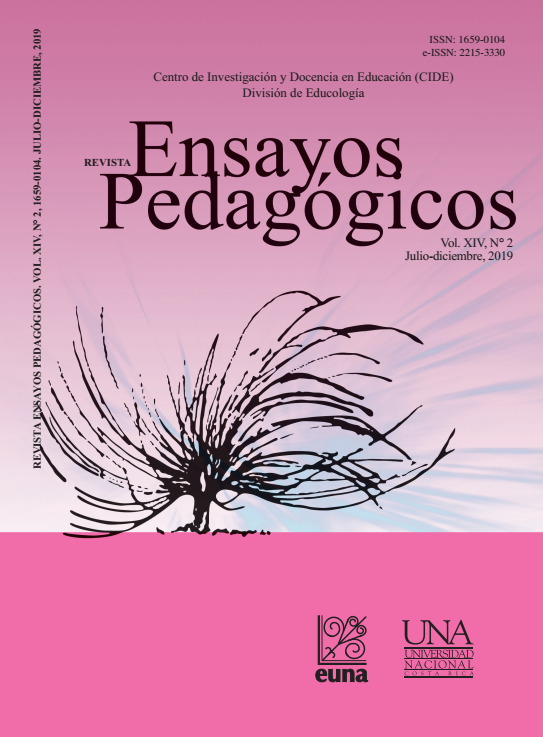Unconscious Transmission in Culture and Education
DOI:
https://doi.org/10.15359/rep.14-2.5Keywords:
unconscious transmission, education, culture, psychoanalysisAbstract
The word transmission is often used in our daily speech as a simple noun, and we find it accompanied by others that give it context, for example, sexually transmitted diseases, television transmission, heat transmission, data transmission, etc.; here it is tangible to distinguish what is transmitted and predict possible outcomes; On the other hand, if we study the particularities of unconscious transmission, we enter loose terrains, as it is an imperceptible phenomenon, whose results can not be controlled. The purpose of this essay is to explore this peculiar mechanism shared by two concatenated areas that are culture and education. This essay addresses examples that we consider paradigmatic to study unconscious transmission, which goes beyond any historical or anthropological proposal. Likewise, conceptual differences are proposed between other apparently similar phenomena such as communication and teaching; we will make special emphasis on the very famous preconceptions about the transmission of knowledge, because since Plato its impossibility is anticipated. Finally, the issue of unconscious transmission in culture and education is linked to that of ethics, as awareness is gained of the power of the unintentional word in the training of learners.
References
Calderón de la Barca, M. (1978). La vida en México. Durante una residencia de dos años en ese país (1839-1841) Colección “Sepan cuantos…” N.˚ 74. México: Porrúa.
Chemama, R. (1993). Dictionnaire de la Psychanalyse. Paris, Larousse.
Cornaz, L. (1994). La escritura o lo trágico de la transmisión. México: Editorial Psicoanalítica de la Letra, A. C.
Da Cunha Pereira, R. (2015). Derecho y psicoanálisis la subjetividad en la objetividad en los actos y hechos jurídicos. Aequitas, 9 (9), 49-74.
Debray, R. (1997). Transmitir. Argentina: Manantial.
Durkheim, E. (1975). Educación y sociología. Barcelona: Península.
Esopo (2007). Fábulas completas. México: Letras Mayúsculas.
Freud, S. (1988). Presentación autobiográfica. En J. L. Etcheverry (Traduc.), Obras completas: Sigmund Freud (Vol. 24, pp. 1-66). Buenos Aires: Amorrortu. (Trabajo original en 1920).
__________ (1988). Estudios sobre la histeria. En J. L. Etcheverry (Traduc.), Obras completas: Sigmund Freud (Vol. 2, pp. 1-311). Buenos Aires: Amorrortu. (Trabajo original publicado en 1893).
__________ (1988). Introducción al narcisismo. En J. L. Etcheverry (Traduc.), Obras completas: Sigmund Freud (Vol. 13, pp. 65-98). Buenos Aires: Amorrortu. (Trabajo original publicado en 1914).
__________ (1988). Inhibición, síntoma y angustia. En J. L. Etcheverry (Traduc.), Obras completas: Sigmund Freud (Vol. 20, pp. 71-164). Buenos Aires: Amorrortu. (Trabajo original publicado en 1926).
Howlet, M. (1981). El concepto de iniciación. Revista Ornicar, 2, 129-147.
Lacan, J. (1986). El seminario de Jacques Lacan libro 3 1955-1956. Las psicosis. Buenos Aires: Paidós.
Lacan, J. (1991). El seminario de Jacques Lacan libro 17. El reverso del psicoanálisis. Buenos Aires: Paidós.
Legendre, P. (1996). El inestimable objeto de la transmisión. Lecciones IV. México: Siglo XXI.
Lévi-Strauss, C. (1987). Antropología estructural. España: Paidós.
_____________ (2007). Mito y significado. España: Alianza Editorial.
Meirieu, P. (1998). Frankenstein educador. Barcelona: Laertes.
Morales, M. (2011). Transmisión y apropiación de la ley en la educación. Aportes del psicoanálisis a la pedagogía. México: UNAM.
Nabokov, V. (1991). Lolita. Barcelona: Anagrama.
Peacock, J. (2001). La lente antropológica. Luz fuerte, enfoque suave. México: Alianza Editorial.
Platón (2001). Diálogos de Platón. México: Porrúa.
Recalcati, M. (2003). La clínica del vacío. Anorexias, dependencias, psicosis. España: Síntesis.
Reyes, A. (1962). Obras completas. Religión griega. Mitología griega. Tomo XVI. México: FCE, Colección Letras Mexicanas.
This, B. (1980). El padre: acto de nacimiento. España: Paidós.
Unamuno, M. (1989). Amor y pedagogía. España: Colección Austral.
Published
How to Cite
Issue
Section
License
Ensayos Pedagógicos is subscribed to the Attribution-NonCommertial-NoDerivatives 4.0 International Creative Commons Licence, which allows both authors and readers to freely download, store, copy, and distribute the final approved publisehd version of the manuscript (post-print) as long as this is done without commercial purposes, no derivative works are generated, and the source and author are mentioned. As well, Ensayos Pedagógicos declares that authors will remain the rightful owners of the copyrights of their work in perpetuity.







